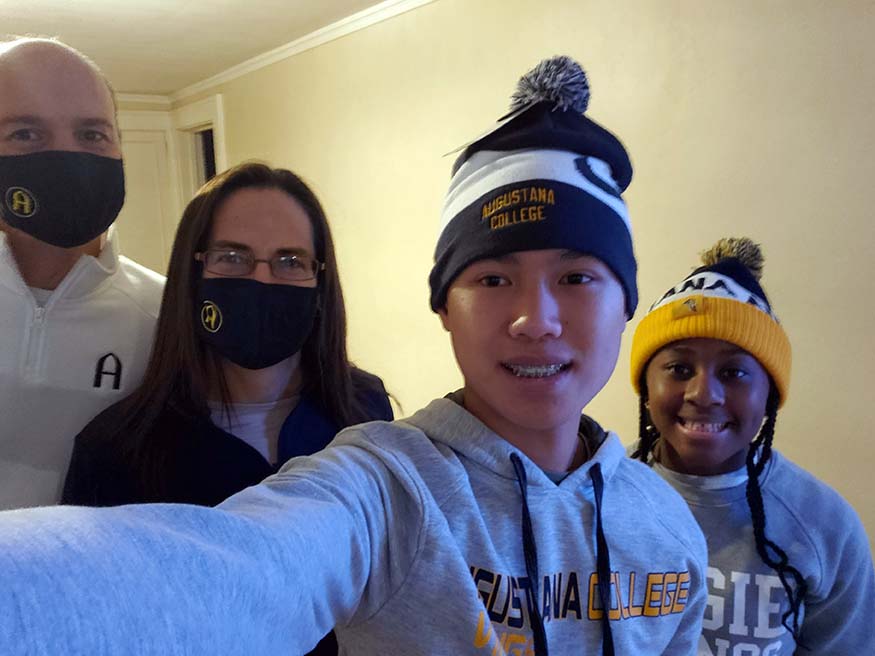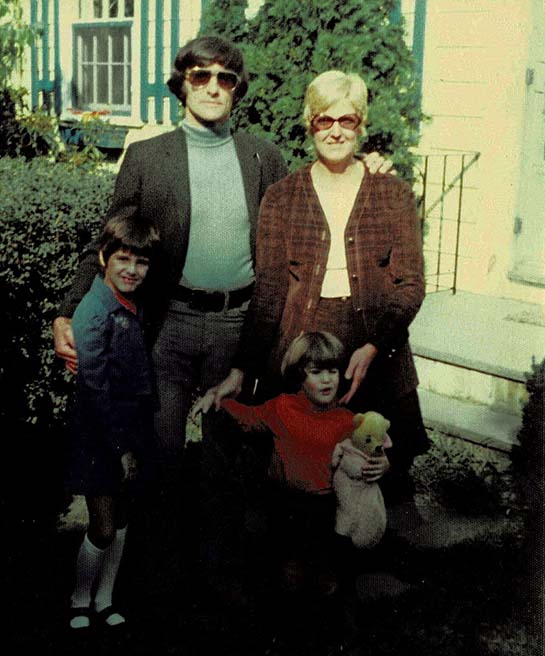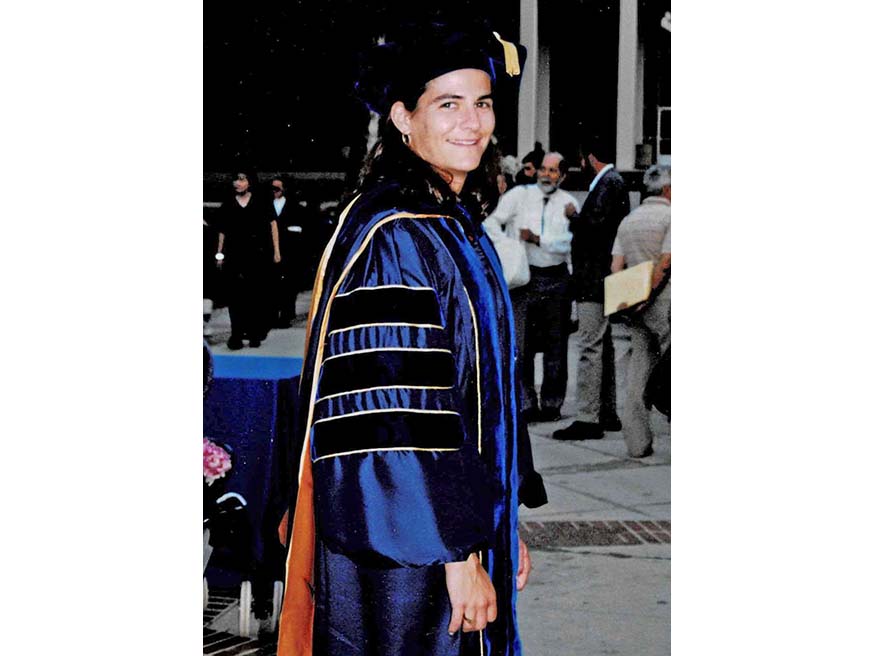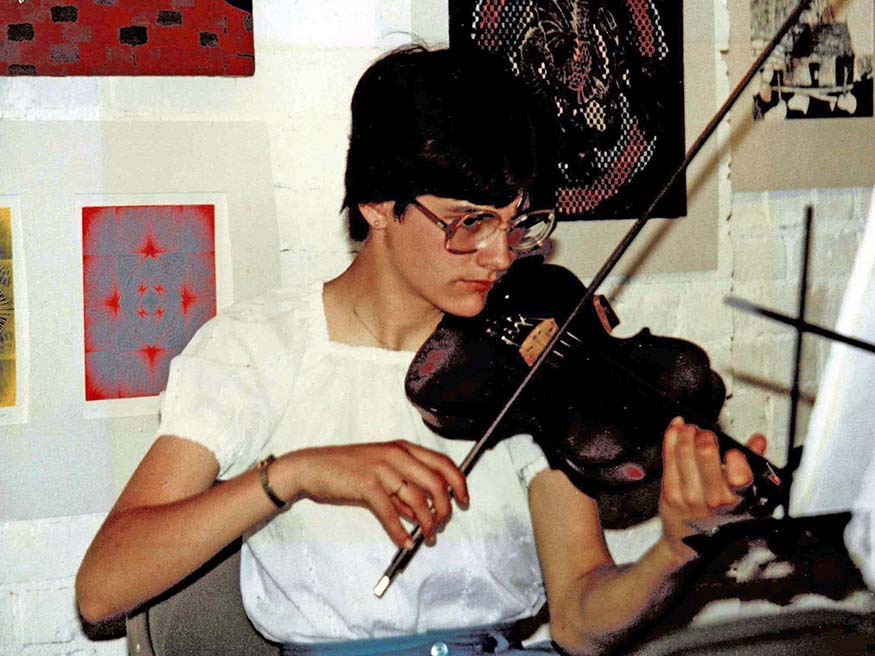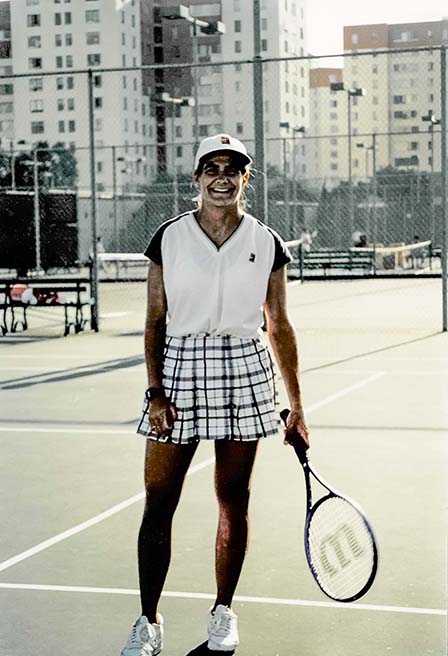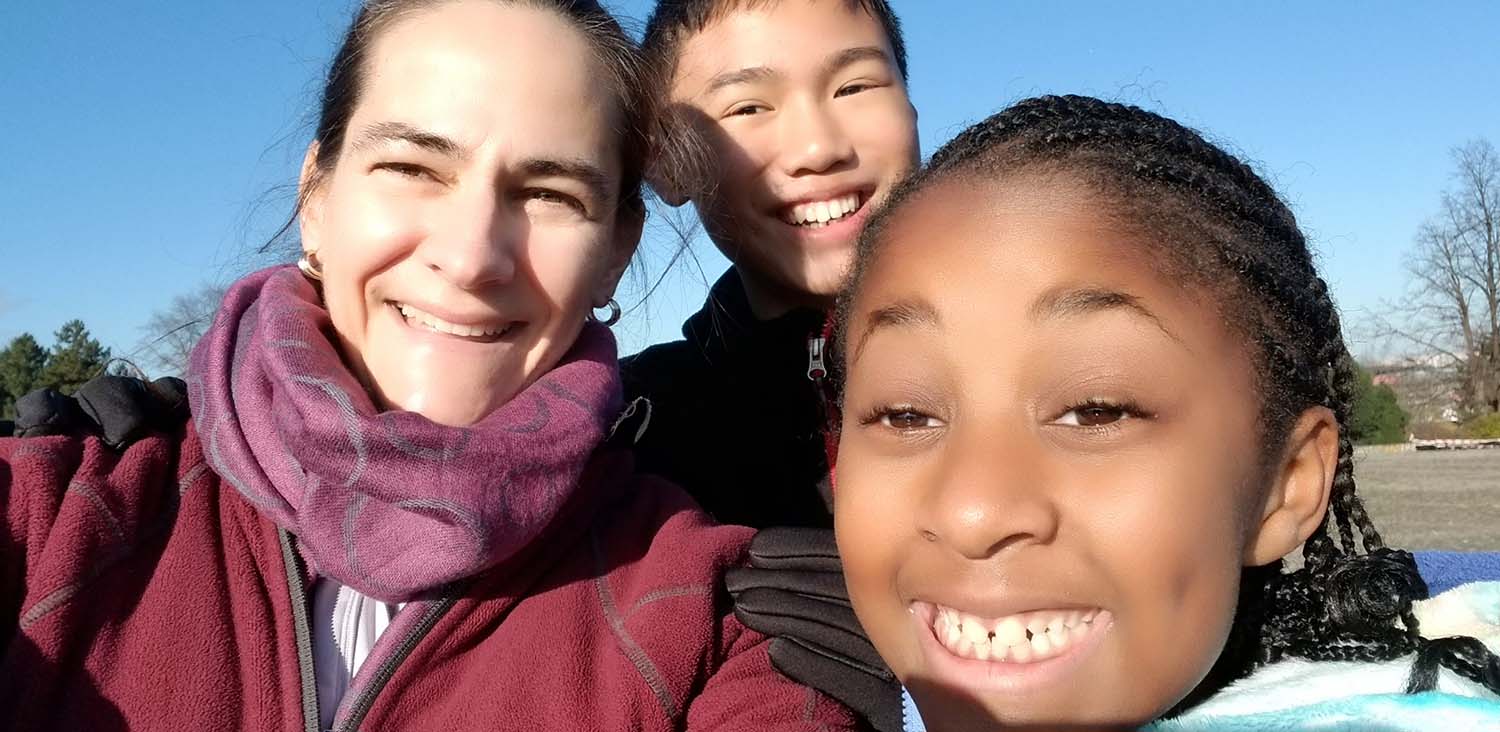A conversation with Dr. Andrea Talentino
On Dec. 7, the Augustana College Board of Trustees named Dr. Andrea Talentino as Augustana's ninth president, effective July 1, 2022. She spoke with members of the Office of Communication and Marketing prior to the announcement.
Q: When you heard about our search for a new president, what made you pursue the opportunity?
A: Augustana’s mission and vision reflect what I care about. In my work, I’ve focused on creating an inclusive, holistic, challenging, integrated student experience that offers a real transformational opportunity.
The creation of CORE (Careers, Opportunities, Research, Exploration) is all about how to bring that transformational education together and create both community on campus but also extend far beyond that. When students leave Augustana, they’re carrying what becomes more than the sum of its parts.
Any institution can have internships, study abroad, opportunities for research, but it’s how you put them together, how you create natural connections and meaning between all of them that makes the difference in what’s outstanding and what is ‘Just fine,’ and Augustana seems committed to being outstanding.
Q: Are there similarities between Nazareth College and Augustana College?
A: I do see some. That holistic attention is something I’ve tried to build since I’ve been at Nazareth. But certainly the interfaith commitment, the social justice commitment — those are things that have always been important but never more so than now.
In its 161 years, Augustana has been an important place and a meaningful place, but I think never more important than now because of the trends we’re seeing in society and in politics, and the world in which college-age people are growing up. There is so much emphasis on things that are really the antithesis on how we want people to think, not in terms of what they think, but just the fact that they are thinking, that they are assessing for themselves what is important and what’s not. And that they understand you can disagree without being disagreeable.
That diversity of thought and diversity of appearance matter. To me, this is a moment when Augustana can really step into that as much, if not more, than at any other point in its history.
Q: Is this what excites you about coming to Augustana?
A: For sure! What also excites me as part of that is Augustana seems to be at this moment where the community is thinking ‘OK, what do we do next? How do we catalyze and move forward?’ The Augustana community is also very aware of the social and political context that it’s in. I’ve never heard so many people at an institution talk about the problems facing higher ed, and the challenges. It seems to be a community willing to think about how to address some of those challenges.
That’s super exciting — to be in a creative and innovative place where people have an understanding of what they’re facing and are excited about meeting those challenges. That’s saying a lot. Thinking about these things is hard, messy, time-consuming and sometimes stressful but to have an opportunity to enter that conversation and thought process is exciting to me.
The most important thing an institution can do is to show students how to integrate their experiences so they're able to end up at a point they never imagined they would be.
Q: Which of your achievements at Nazareth College are you most proud?
A: The single most important one is the creation of our Institute of Technology, Artificial Intelligence and Society and the three degree programs that go along with that. I think it’s very important for the world and for our nation to think about the ethical application of technology and the fact that humans are biased, and we put our biases into computers, machine learning and algorithms. So we can't just say, ‘Oh well, that's the computer that spit it out, right?’ No, we put it in. So it's reflecting to us what our own beliefs and thoughts are. Thinking about that differently and exploring how we try to change some of those beliefs and thoughts, at least as they’re systematized and put into institutional form, is important.
I have to add that this was very different for Nazareth. I mean, Nazareth is a touchy-feely place, right? This is not where you do tech. RIT (Rochester Institute of Technology) is right down the road. If you want to be a coder, that's where you go. We don't even have a computer science program. So when I first proposed it, everybody's like ‘What, sounds pretty crazy ... Why would we do that?’
Getting people to think about it in terms of how it fit the Nazareth mission and vision was fun because it truly is consistent with how we started, why we were founded. It's all about social justice and social innovation.
So that was exciting, and I think it’s changed the way people thought about what Nazareth could do. Nazareth is just about a little bit bigger than Augustana, about 2,700 students. And we were accepted to be part of a national group, which included Carnegie Mellon and Cal and Stanford and MIT and then us. It turned out that not only did we belong, but we were leading the conversation in terms of ethical uses of technology ... we weren't following. The other schools didn't know how to do it. But that's because they're starting from the tech and trying to graph on the ethics. And we went the other way. We started with the ethics and then put the tech on top of that. It’s been super exciting in all kinds of ways to explore this.
Q: We touched on this earlier, but how can a college provide the most meaningful experience for a student?
A: The most important thing an institution can do, and this is what I think makes that difference between a good education and a transformative one, is to show students how to integrate their experiences so they're able to end up at a point they never imagined they would be.
There are going to be twists and turns because you will do something and think, ‘Whoa, I thought I would like that, and I hate it.’ Or you fall into something, and you say, ‘Wow, that was amazing. I never imagined it.’
It’s not a linear path at all, but the reinforcement has to be there to help students think across and beyond their experiences so they understand how they are helping to shape them.
Q: Any thoughts on what you see in Augustana’s future in terms of work in progress or new initiatives?
A: Innovative programs are in demand. You've already started with the new health sciences building. I think that provides a great platform for thinking about other areas to expand on as well, such as graduate programming and non-degree programming.
We know the number of 18- to 20-year-olds is declining, and that it’s going to keep declining for a while. But there is a growing demand for other types of education. You have to be careful with it, obviously, because you want it to be consistent with your values and your mission, and you also want it to be complementary to the degree programs that you do have.
But, particularly in a place like the Quad Cities where there's a pretty large population and many different businesses, there’s a lot to think about. There will be people who want to go into different lines of work or learn new capabilities and knowledge bases for the work that they're in so that they can advance. There are many interesting areas to explore, and that also will create more great community partnerships, whether it’s businesses or non-profits or schools or whatever.
Another area that you can’t have enough of and where every institution can always do more creatively, are experiential opportunities for students — a big focus on project-based learning, which is increasingly what students are used to.
When I went to college, we sat in the classroom and listened to the professor. It’s so much more active and engaging today, and it's so much more varied, which is exciting. Continually finding ways to integrate that both into the curricular and co-curricular I think is important … and giving students ways to lead that themselves.
I'm a big believer in putting students at the center of shaping their experience. For example, at Norwich University, when I created the Peace and War Center, everything we did there basically was student-run. We got a grant from NATO to run a conference in Macedonia, and the students ran it. The attendees could not believe that it was student-run.
I believe that that kind of emphasis is important not only in terms of how it develops students, but how it distinguishes an institution. There are not many that have the guts to do that because who wants their NATO conference to fail? But nine times out of 10, and especially if you prepare students well and set clear expectations, they end up making us as proud as can be.
Q: Have you had opportunities to engage in the communities in which you’ve worked?
A: Absolutely. I really started when I was in Vermont at Norwich University. I don’t know if you've ever spent time in Vermont, but community defines the state. That's what it's all about. So you're very much engaged, both in a professional and personal capacity. There's sort of an expectation that people are going to commit to, you know, the world together. And that's something I've carried with me since.
Q: Your dad was an English professor at SUNY Cortland. Did he influence your career aspirations?
A: Certainly not consciously. But when I was a kid, I sometimes had to tag along at his office, and I kind of liked that. This was back in the days of blue books, too. So he would give me blue books to draw in. And I would only draw around the margins because that's where he wrote when he was commenting on student writing.
Fundamentally though, I think the most important thing is the concept of being a teacher. Everything I've ever done is about being a teacher. And I think my dad very much looked at it from that same point of view and valued his interactions with students. That's something I've always valued as well.
Q: So, what you love about teaching you can also find in your administrative work?
A: Yes, it's development all the time, right? It's personal development, and it's institutional development, and you have to do both because you don't succeed if you only do one.
An institution is not going to move forward if you're not also developing the people, and the people aren't going to be motivated and excited if you're not moving the institution forward.
It’s like being a coach. When I was a tennis coach, everybody had different needs and demands. You have to learn how to motivate everyone. It's never boring; I'll tell you that. And when you get it going right, there's no greater feeling.
Q: Early in your teaching career, did you see yourself as a college president one day?
A: No, I didn't. In fact, when I was teaching at Drew University, I accidentally ended up being the chair of the political science department. The previous chair had health issues and had to step out, and there was no one else to step in. So I did it just to kind of help out the department.
When my term was ending, I couldn't wait to close my door and just do my own projects. And then the dean asked me if I would be the associate dean. I thought he was joking. He told me to think about it. I did and came up with several demands, which I felt confident were going to exclude me from the position. I met with the dean and made my demands. Then I walked out and called my husband. I said, ‘That didn't go the way I thought it was going to go. I think I just got that job.’ So that's how it all happened accidentally.
But what became clear to me before too long ... you've read my CV ... and know that I include that I have been a camp administrator and a coach. A couple months into doing administration, I realized I'd put on an old skin that I missed and really loved. It was very much like when I'd been a camp administrator or a coach. It's a different medium, obviously, and different substance. But the concept of trying to move a collective forward and also support individual creativity and development and accomplishment as part of that is something that I love. I'd forgotten it during my early career at Tulane and then my first couple of years at Drew. When I rediscovered it, I loved it.
Q: You have published extensively; what are your research specializations?
A: For the bulk of my career, I’ve focused on military intervention and civil conflict — more specifically, inter-organizational cooperation or more often, lack of cooperation. So that's like, in a place like Afghanistan, how NATO and the EU and the U.N. work together.
But what’s kind of my pet project, which I love and is probably more what I do now because it's easier for me to enter into and out of in the limited time I have, is study the Olympics and their use within international politics.
In fact, I was scheduled to go in the spring of 2020 to the International Olympic Committee archives in Lausanne, Switzerland, for a week to do research for a book that I was working on. But since COVID came, I haven't done a thing, and I don’t necessarily see myself having a lot of time to work on that now, but we'll see.
Q: Can you tell us about your family?
A: Yes! Both my children are adopted. My son Lucien is 14, and he was born in Ho Chi Minh City, Vietnam. I'm an international relations scholar, and he’s given us a connection to Vietnam, which is fun. We visited when he was 10, and we'll probably try to make another trip in about a year. My daughter Julia is 10, and she was born in Newark, N.J.
When we first started the adoption process, the social worker said, ‘What do you want your kids to look like?’ And I thought that was a strange question. She said, ‘Well, a lot of people want their kids to look like them or maybe they want specific eye color or hair color.’
This was not something my husband I had talked about, but in that instant, the light bulb went off, and I knew my answer. I said I want them to look as unlike me as possible because I want my family to represent how I understand the world, which is difference. It's diversity, but it's also a commonality of humanity. And I want my family to look like that. So we do. My daughter is Black. Lucien obviously is Asian. My husband and I are white, and that’s the family.
Q: What's something about yourself that might surprise people?
A: This isn't necessarily something about me, but it’s something I've done. I was a teaching tennis pro at a club in Los Angeles for six years, and I gave Jennifer Lopez a tennis lesson. I will say she wasn't J.Lo yet. It was right before the movie ‘Selena’ came out, so it was before she became a big star. But it does gives me a lot of cred with my son and the 14-year-old crowd.

